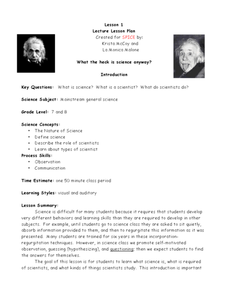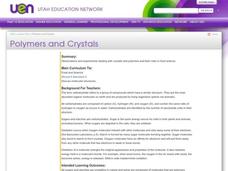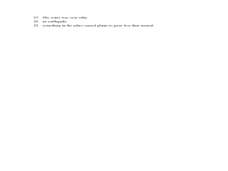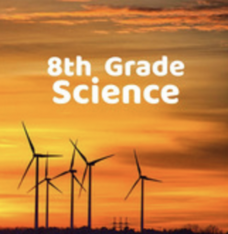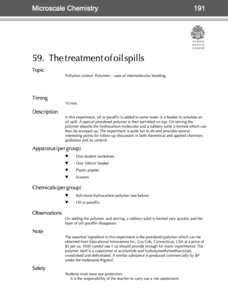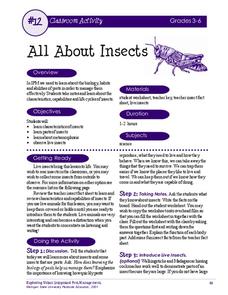Curated OER
Physical Science Review Questions
Prepare your class for a quiz with these physical science review questions. Learners respond to 7 questions about ionic and covalent bonds, oxidation states, and chemical and physical changes. In addition, they name compounds and balance...
Nuffield Foundation
Observing Osmosis, Plasmolysis, and Turgor in Plant Cells
Create the perfect conditions for osmosis. Young scholars use a microscope to observe plant cells exposed to distilled water or sodium chloride. They observe how osmosis creates turgid or plasmolyzed cells.
Curated OER
What the Heck Is Science Anyway?
Here is a 12-page outline of an introductory science lesson. The teacher lectures on what science is, the role of a scientists, different disciplines of science, and the impact of scientific discoveries. Detailed lecture notes are...
Curated OER
Polymers and Crystals: Their Role in Food Science
Blend chemistry with cooking in this exploration of polymers, carbohydrates, and food science. Experimenting with gelatin produces concrete examples of the bonding and ploymerization discussed in the lesson. Copious, comprehensive...
Curated OER
Shadows & Light, Science & Puppetry
Lights, shadows, action, and inquiry await your artistic scientists. They explore the way light travels, absorbs, reflects, and transmits through shadow play. They create folktale-inspired shadow puppets, explore the science of light,...
Curated OER
Fifth Grade Science
In this science worksheet, 5th graders answer multiple choice questions about the ocean, animals, rocks, and more. Students complete 25 questions.
Utah Education Network (UEN)
Utah Open Textbook: 5th Grade Science
How do Earth's changes affect humans? Pupils learn about physical and chemical changes on Earth and how they lead to erosion, earthquakes, and volcanoes. Using the text, they also explore the concepts of electricity and magnetism by...
Utah Education Network (UEN)
Utah Open Textbook: 8th Grade Science
The cycle of energy is important to many different systems on Earth. Scholars use questioning and observation to investigate the differences between renewable and non-renewable resources and how they relate to global changes. They...
Berkshire Museum
Nature Journaling: Experience the Outdoors Through Writing and Drawing
Step into the great outdoors and develop young scientists' skills of observation with a nature journaling lesson. Given a specific focus or goal, children practice making and recording observations of nature through written descriptions...
University of Kentucky
Beneficial Bug Scavenger Hunt
Many people think of bugs as annoying pests to be squashed, but most insects and spiders are beneficial, eating the actual pests or pollinating plants. After reviewing some of the common bugs in your area (they may differ from those...
Science Friday
Ugh, a Bug!
Young entomologists familiarize themselves with the physical characteristics of insects. Composed of two activities, each instructional activity involves your scientists tapping into their prior knowledge of bugs and making observations...
PBS
The Cat in the Hat Activity Exploring Weather
Observe different types of weather right in your classroom! Here, pupils look at clouds, rain, snow, wind, and hot and cold temperatures, and observe these weather patterns at school. They keep track of their observations in a worksheet...
Center for Learning in Action
Investigating Physical and Chemical Changes
Super scientists visit ten stations to predict, observe, and draw conclusions about the physical and chemical changes that occur when different states of matter—liquid, solid, and gas—are placed under a variety of conditions. To...
Royal Society of Chemistry
The Treatment of Oil Spills—Microscale Chemistry
When oil spills happen, how is the oil cleaned up? Pupils of polymer science discover an amazing substance that turns oil into a solid during a microscale experiment. Individuals observe oil or paraffin before and after addition of the...
Scholastic
Minibeasts
Lead young scientists to discover insects outdoors. After investigating, students will record observations, learn about these fascinating creatures, craft, and role play.
Michigan State University
All About Insects
Insects are the focus of an activity that looks deep into the anatomy and metamorphosis of everyday bugs. Two worksheets reinforce knowledge obtained through a teacher-guided grand conversation and insect observation.
Marine Institute
Water Pollution
Sixth graders investigate the various types of pollutants found in water and ways to help prevent water pollution. Through a hands-on experiment, students create samples of polluted water by mixing water with vegetable oil, dirt, and...
Towson University
Mystery Tubes
How do scientists know they're right? Truth be told, they don't always know. Explore the scientific process using mystery tubes in an insightful activity. Young scientists discover how to approach and solve problems in science, how ideas...
Museum of Science
Egg Bungee
Think bungee jumping looks scary? Knowing the science behind bungee jumping might make it less so. Using an egg and rubber bands, young engineers model bungee jumping. They test the distances that the egg falls for different numbers of...
University of Texas
Observing the Moon
Why does it look like there is a man on the moon? Why does the moon look different every night? These are the focus questions of a lesson that prompts class members to observe and record the nightly changes of Earth's natural satellite.
University of Waikato
Observing Water's Thin 'Skin'
Keep the tension up in the classroom. The class first observes as the teacher creates a dome of water above a glass by adding paperclips into an already full glass. Classmates then work in pairs to see how many drops of water can fit...
California Academy of Science
Composting: A Scientific Investigation: California Academy of Sciences
Garbage, recycle, compost: Does it really matter where we put our trash once we are done? By making detailed observations over seven weeks, kids will see which materials break down naturally to become a healthy part of the soil, and...
Virginia Department of Education
Charles’ Law
Searching for a relatively interesting way to demonstrate Charles' Law? Here is a lesson in which pupils heat air inside a flask and then cool the flask to quickly cool the air. They make observations about what occurs during the cooling...
Scholastic
Study Jams! The Moon
Take your class to the moon and back with this compact slide show. A mix of computer-generated images and photographs are supported by explanatory text. Observers learn about the moon's movements, its physical features, and its phases....
Other popular searches
- Making Observations Science
- Science Observations Sorting
- Making Observations in Science
- Outdoor Science Observations
- Observations in Science




